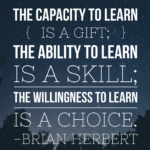
Should I still apply?
Dear Jenny,
Is it still worth applying for a job if I don’t have all of the desired skills and experience? Will I even have a shot if I can’t do everything they’re looking for? What’s the best strategy for applying, or should I just pass on the job all together?
Thanks,
So Close Yet So Far Away
Dear So Close Yet So Far Away,
The rule of thumb is that you only need to have 70% of the requirements to make applying worthwhile. Do not let a long list of lofty requirements scare you away from an awesome opportunity. There are some simple rules to remember when looking over a job description that will get you out of a “they would never want me” mindset, and into a “look at all of this awesome-ness I bring to the table” one.
 When employers write the job requirements, they think of it as a wish list. They know that a new hire will have to be trained, regardless of the skills they bring to the table. That’s why potential, attitude and aptitude are way more important and valuable than being the exact fit or having the perfect prior experiences.
When employers write the job requirements, they think of it as a wish list. They know that a new hire will have to be trained, regardless of the skills they bring to the table. That’s why potential, attitude and aptitude are way more important and valuable than being the exact fit or having the perfect prior experiences.
Just because you don’t have the exact skills the job description is requesting, it doesn’t mean you don’t have skills that are similar! Be sure to play up your transferable skills by explaining how they translate to the position. Use this as an opportunity to showcase that you’re tech savvy, a quick and eager learner, etc.
 But Jenny, how do I do this? With a kick-butt cover letter, of course! You want the hiring manager to look at your cover letter and think “they get it.” This is the place to show the similarities between softwares, programs and tools that you know to the ones listed on the job description.
But Jenny, how do I do this? With a kick-butt cover letter, of course! You want the hiring manager to look at your cover letter and think “they get it.” This is the place to show the similarities between softwares, programs and tools that you know to the ones listed on the job description.
Here’s an example: If they’re asking for experience building emails in HubSpot, but you’ve only used MailChimp, highlight the similarities between the two – you can build custom templates, pull analytics, run A/B tests and more. This shows the skills you possess beyond the software. And remember, that’s way more valuable to a hiring manager.
 Ready for the cherry on the cake? Have some references ready who can vouch for the skills you bring to the table. This goes beyond the technical skills, and should include soft skills like leadership, communication or time management. A hiring manager knows they can send a new hire through a training program to learn a new software. But it’s much harder to teach a new hire how to be a good communicator.
Ready for the cherry on the cake? Have some references ready who can vouch for the skills you bring to the table. This goes beyond the technical skills, and should include soft skills like leadership, communication or time management. A hiring manager knows they can send a new hire through a training program to learn a new software. But it’s much harder to teach a new hire how to be a good communicator.
When you’re ready to write your list of references, get your top-picks of bosses and coworkers, make sure they agree to be a reference for you, and give them a heads up that they might be contacted soon. When putting together your list of references, cue them up to tell a story about how you saved the day on a project. This would look like:
John Smith
ABC Company
(123) 456-7891
john@company.com
John was my direct supervisor during my time at ABC Company. He saw me use my knowledge and training with XYZ program to code a custom solution and prevent a delay with our project launch.

Last, but definitely not least, always take the opportunity to learn new skills that will help advance you into a new role… even if it’s on your own time. There is a whole internet full of inexpensive or free trainings just waiting for you to dive into. If you haven’t had a job that requires you to learn a program, but it’s popping up a lot as a requirement in your job hunt, go take a class about it. It will show initiative (bonus) and you’ll be ready to hit the ground running when you do land that new job.
 This topic is especially important for women, since men are far more likely to apply for a job they aren’t a perfect fit for than women are. So ladies, here is a little pep-talk just for you. Apply. Do it. You are worthy and smart and hiring managers will see what you bring to the table, not what you’re lacking. And as a general reminder, you will only get a job if you apply in the first place.
This topic is especially important for women, since men are far more likely to apply for a job they aren’t a perfect fit for than women are. So ladies, here is a little pep-talk just for you. Apply. Do it. You are worthy and smart and hiring managers will see what you bring to the table, not what you’re lacking. And as a general reminder, you will only get a job if you apply in the first place.
 Sincerely,
Sincerely,
Jenny


